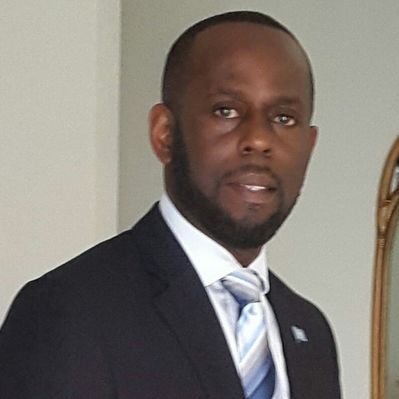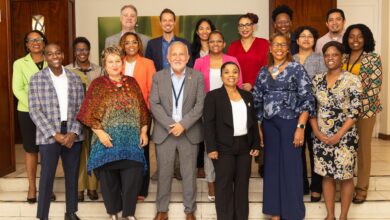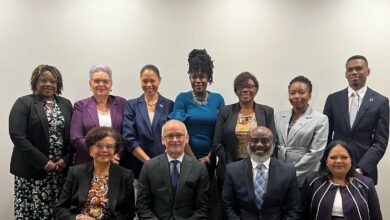The Caribbean Community Secretariat welcomes the opportunity to participate in today’s Latin America and the Caribbean Regional Programme (LACRP) Meeting of International Partners, and it is a pleasure to be addressing you today. Dr Carla Barnett, Secretary-General, CARICOM welcomes this conversation as we transition to the third cycle of the Regional Programme.
As a Secretariat, we represent 15 independent Member States, and 5 Associate Members, and regional integration remains our primary mandate. The third LACRP is therefore opportune and as we refine our partnerships with the OECD and partners across Latin America, we welcome the opportunity to highlight our priorities for development.
The 2022-2025 LACRP will cover the first three years of CARICOM’s Strategic Plan and we are happy to share and explore areas in which we can build partnerships for the achievements of verifiable results. The support we receive from our multilateral partners is a quintessential pillar in our quest to transform our Community and working with you through the LACRP mechanism is of utmost importance.
SUSTAINABLE DEVELOPMENT
Our region faces a future that is both worrisome and pregnant with opportunities. The rise of global temperature 1.5% above pre-industrial levels continues to be our most existential threat. We cannot build a sustainable future, if the very islands and low-lying coastal states upon which we live are under the threat of rising sea levels, drought, floods, and unpredictable weather patterns that threaten food security and food production in our Community. We however see opportunities folded in strong partnerships, resolute engagements and inter-regional commitment which bode well in our pursuit of improved livelihoods, economic development, sustainability and expansion of a better way of life for our citizens.
The Caribbean Community Secretariat (CCS), backed by its 15 member states, will use every opportunity during formal negotiations and meetings of high political relevance to champion our call for climate justice. It cannot be, that countries that are identified as heavy polluters are remaining oblivious to the existential crisis that their pursuits of industrial gain have caused and continues to cause.
CARICOM notes the OECD DAC’s proposal to convene a dedicated meeting with SIDS. It is our hope that this meeting will squarely place on the proverbial front burner, the issues that confront SIDS, especially those related to the arduous, lengthy, and often times unresponsive procedures for accessing climate finance. The OECD’s credibility rests upon how the organization treats with and responds to the inescapable peril that awaits nation states that have contributed little to climate change but that are on the frontlines of the most devastating impacts predicted.
We are cognizant that this is the last decade of the 2030 Development Agenda and as a region, CARICOM will prioritize interventions in Disaster Risk Reduction, compensation for loss and damage, adaptation, food security, management and conservation of the fisheries resources of the region, and enabling mechanisms to access climate finance.
INCREASING PRODUCTIVITY
In recognition of the critical role that industrial productivity will play in regional development under the established mandates of the CARICOM Single Market and Economy (CSME), CARICOM Heads of Government have assigned lead responsibility for industrial policy to the President of Suriname in the region’s quasi cabinet. I hasten to add that the mistakes of the industrial nations will not be repeated, and CARICOM will be guided by the principles of green growth and low-carbon development strategies as we pursue our regional and national industrial policies.
Our region recognizes that regional food production will be critical if we are to transform our region and build resilience. In order to achieve measurable results, CARICOM has established an Inter-Ministerial Working Group on Agriculture with the aim of reducing the region’s food import bill by 25% by the year 2025. This initiative will assist in rebalancing trade and is estimated to save the region in excess of US $ 2 billion per year. I welcome an opportunity in the future, to engage LACRP in exploring support to make this initiative a reality.
On 3 March 2022, CARICOM Heads of Government met with their counterparts of the Central American Integration System (SICA). This meeting served to redouble the commitment of both sub-regions to the transformative force of regional integration in achieving inclusive sustainable development outcomes and committed to continue strengthening their respective regional integration platforms of which they are members, and for others in which we share membership.
GOVERNANCE
Although the Caribbean is known for its foundational grounding in democratic governance, we remain committed to improving our governance systems particularly in relation to regional integration. The 2022 – 2025 period will therefore focus on enhancing governance mechanisms that will set the basis for the Caribbean to maximize economies of scale and promoting the CSME as the main avenue for achieving the regional development agenda.
One critical trouble spot for CARICOM is the situation in Haiti. As a Member State of the Caribbean Community, Haiti presents very unique and special circumstances that cannot be resolved through the application of the usual support systems that govern the rest of CARICOM. We are committed to helping our brothers and sisters in Haiti and as the 33rd Intersessional Conference of Heads of Government agreed, CARICOM will establish and deploy a Team to assist in determining how best to support democratic governance, peace, security and social development in Haiti.
SOCIAL INCLUSION
As a region, the Caribbean is a microcosm of the rest of the globe with all of the major social and human development demographics that can be found within a population. The median age in the Caribbean is 27 and unemployment amongst women and youth have been worsened by the lengthy debilitating impact of the COVID-19 pandemic.
CARICOM will strengthen social inclusion by focusing on human resource development, youth development and gender equity, health sector development, culture and community development, and crime and security.
All of these areas have been highlighted as priorities for the region and we are thankful to partners who have engaged us in designing interventions in these areas. We are keen to continue building partnerships for advancing our agenda in these areas and as we seek to collaborate more firmly with you, we invite LACRP to consider enhanced cooperation in the social sector.
In closing, I am reminded of the World Bank Report, which indicated that economically, the Caribbean region was the worst affected by the COVID-19 pandemic. The pandemic threatened to devastate the economies of CARICOM Member States and as we rise from the ashes of debilitating reductions in growth and government revenues, increases in social ills, death, and economic devastation, we call on the international community to support the Caribbean in building back better. At its recently concluded Intersessional Conference of Heads of Government, CARICOM agreed to explore deepening research, access to funding, and establishing the necessary incentive regimes to enhance our capacity to respond to crises and exogenous shocks such as COVID-19. We must extend a hand of friendship to our partners and in so doing wish to undertake the mission of regional integration and development with the kind support and assistance of the LACRP.
END






